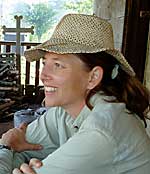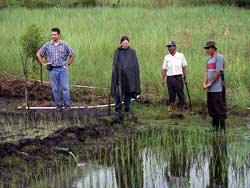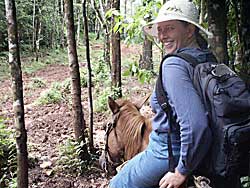RPCV Florence Reed — Living The Third Goal, Saving The World
Recently the National Peace Corps Association hustled some money from the Gates Foundation and started up Africa Rural Connect. ARC began its operation by asking the question: “Where should development agencies spend their money? That’s what you, as a returned Peace Corps volunteer, can help us figure out.”
 Well, ARC — why don’t you ask Florence Reed? Take a look and see how this woman has already achieved in Central America what you want to do. This is just one RPCV who with little organizational help (or funding from Gates!) has managed to establish Sustainable Harvest International (SHI).
Well, ARC — why don’t you ask Florence Reed? Take a look and see how this woman has already achieved in Central America what you want to do. This is just one RPCV who with little organizational help (or funding from Gates!) has managed to establish Sustainable Harvest International (SHI).
In her bio on the SHI website it says that Florence Reed (Panama 1991–93) believes that when people work together, things change for the better. In 1997, she founded Sustainable Harvest International, a nonprofit organization dedicated to working with rural Central American communities to implement sustainable land-use practices. As president of the organization, Florence spends her time guiding SHI forward with Central American farmers, Central American staff, Board members, US staff and supporters, bringing together a wide variety of individuals to create a better future. In recent years she has received an honorary doctorate for her work, along with many, many other awards for her good work. She has yet to be recognized by the NPCA or the Peace Corps.
I talked with Flo about her work and her history with the Peace Corps. Here’s what she had to say.
Flo, first off: where are you from?
I grew up in Fairfield, Connecticut and attended the University of New Hampshire where I had a dual major of environmental conservation and international affairs with a minor in Spanish.
And then you joined the Peace Corps?
Yes, and I went to Panama in 1991 to do environmental education but really ended up doing forestry extension.
What happened to you after the Peace Corps?

At the Panama Canal
Well, I stayed in Panama for a while and was thinking about starting a demonstration farm with a Peace Corps friend. That never happened and I ended up moving back to the US where I worked for a couple of different non-profits. One non-profit taught me a lot about how a good nonprofit operates; the other one showed me what I would want to avoid in establishing a good nonprofit. Eventually my troubles with the latter organization led me to establish Sustainable Harvest International. That second nonprofit was pulling funding from work that was just about to get off the ground in Honduras and I felt personally responsible to not let down the people we had hired or the families who had signed up to work with us. Thankfully, an angel in Switzerland sent me a generous check out of the blue on a day’s notice when he heard what I wanted to do and my parents let me use a spare bedroom at their house for an office. I also found a couple of nice guys who owned a local futon store. They gave me a job that paid my bills until SHI could give me a salary and let me use the store office for SHI work when there were no customers or deliveries. They became two of SHI’s first Board members too.

In Nicaragua
When I first started SHI, I spent about 1/2 the year in Central America managing the field program and 1/2 the year in the US mostly finding the funds to keep the work going and expanding to try to meet the ever increasing demand. Since then our staff, both in the field and US-based has grown and gained more experience. Now I am needed more in the US to work with the Board of Directors on things like strategic planning, governance and fund-raising so that is what I do. That also works well with changes in my personal life as I am setting down in roots in Maine with my husband and young son. We have more or less finished building our eco-friendly house (after four years of work on it), and I am finally able to spend some time gardening.
What does SHI actually do? Who do you fund?
SHI is not really a funding organization, though we do provide most of the funding for our affiliate organizations and programs in Honduras, Belize, Panama and Nicaragua. Our mission is to provide farming families in Central America with the training and tools to overcome poverty while restoring our planet’s tropical forests.
SHI facilitates long-term collaboration among trained local staff, farmers and communities to implement sustainable land-use practices that alleviate poverty by restoring ecological stability. Working with SHI, more than 1,800 families have planted more than 2.5 million trees and converted 12,000 acres of degraded land to sustainable land-use practices, thereby saving 60,000 acres of tropical forest from slash-and-burn farming. Participating families enjoy increased income (up to 800%) from alternative cash crops as well as better health due to greater and more varied food crop production.
Why are you so passionate about this to devote your whole life to it?
I want more than anything to contribute in some small way to preserving our beautiful planet and allowing all its people to enjoy a decent life on it. Stories from the farmers working with us are what keep me going. I’d like to share the story of one of those farmers who has discovered the benefits of organic farming and crop diversification. Mr. Ignacio Valle works with SHI’s field trainer, Ramon Osejo, in the community of La Fonseca, in Kukra Hill, Nicaragua. He spoke with us after his family had been working with Sustainable Harvest International for almost a year. In his own words —
I have not worked with Sustainable Harvest for very long, but I’d like to tell you I’ve achieved success because I feel very motivated with the new farming techniques. If you could see in my house this backpack sprayer, I’ve used it with pesticides and herbicides for many years because I never believed I would be able to farm another way. But since Ramón visited us, the first thing he did was tell us that he came to the community to work with families in organic agriculture and he was going to follow up with families interested in making a change for the good of our health, the economy and the environment. Since my wife and I were interested in knowing how to farm another way, we offered our house as a training place for other families.
We were also given seeds for pepper, carrot, pumpkin, squash, tomato, beetroot, bell pepper and cabbage. They taught us how to make the seedbeds and for me it was a great delight when we put the organic fertilizer on the ground and transplanted the young plants. I saw results almost immediately; the leaves of my plants were a very intense green and full of vigor. My entire family couldn’t believe it was possible to farm without spending money [on agro-chemicals].
Now I am harvesting different vegetables and I’m selling bell peppers because I planted the most of those. I’ve had good results with my crop of beans and I also have planted 50 coconuts and pineapples. I am going to plant timber-yielding trees on the banks of my water source. I am so happy with my first experience that I’m going to continue doing more. I want to plant other vegetables because now in my house we are eating as if at a banquet with fruits, vegetables and rice and beans as always. We feel our food is more flavorful and nutritious now and it’s the first time we’ve grown these vegetables.
My family and I thank Sustainable Harvest for giving us this valuable knowledge and we hope never to return to farming with chemicals. We truly need [Sustainable] Harvest to be a presence in the area, for our good and the good of the environment.
How can RPCVs (or anyone!) support you? Where do they send $$$, etc. Where do they write for more information, or what’s a good website for information?
They can find out about how to donate, volunteer or get more information by visiting our website — Sustainable Harvest International or phoning us at 866.683.6594 or writing us at 779 North Bend Rd. Surry, ME 04684.
Florence..The check is in the mail..not as generois as the Swiss guy ..it will buy a few seeds..
John..great find and story.There must be hundreds like it..find them!!!
That’s what I like to hear, Dennis! ; ) Thanks so much.
And, of course, thanks to John for this great site. Maybe I will even get to the blog he has suggested at least while I am recovering from upcoming ankle surgery.